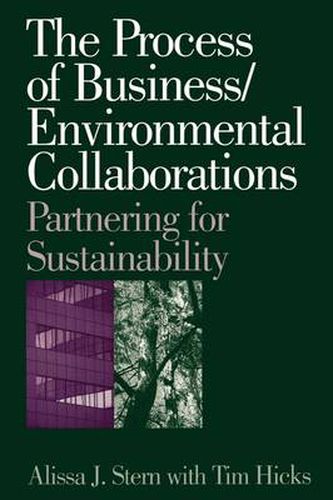Readings Newsletter
Become a Readings Member to make your shopping experience even easier.
Sign in or sign up for free!
You’re not far away from qualifying for FREE standard shipping within Australia
You’ve qualified for FREE standard shipping within Australia
The cart is loading…






Confrontation may be one way of settling environmental disputes but is there another, perhaps better, way? Stern and Hicks say yes-through the process of collaboration. They give executives the practical skills to create and sustain collaborations with environmentalists of all kinds, and environmentalists another way to work with corporations, not as foes but as partners. The book is unique in that it does not demand governmental intervention but puts faith in the disputants themselves to reach amicable, mutually agreeable solutions. Stern and Hicks give practical, tested advice from other dispute resolution professionals, as well as from their own experience, and organize it in a way that enables decision makers and leaders on both sides to understand and cope with the difficulties they will encounter during the course of a collaboration. Well written and illustrated with real world case studies, the book will come as a welcome relief to corporate decision makers, and as an eye-opening, hope-creating surprise for environmentalists of all persuasions.
Stern and Hicks focus on two key issues: whether to collaborate and how to collaborate. They present five in-depth case studies to highlight the challenges and strategies throughout their book. Among the latter are strategies for gaining internal support for proposed collaborations, and ways to identify and enlist the participation of key parties and other organizations with interest in the negotiations. Chapter 5 looks at ways to develop constructive partnerships by drafting ground rules. Chapter 6 shows how to develop a strategic plan for collaborations. In Chapter 7 the authors analyze some of the many process challenges that parties in collaborative negotiations may face and present methods for dealing with them. Chapter 8 evaluates substantive challenges that may arise during the course of a collaboration; Chapter 9 stresses the importance and methods of documenting agreements once reached. Chapter 10 gives strategies for enlisting the help of outside organizations, including government and media, and Chapter 11, how and when to get help from mediators and technical experts. The book concludes with methods to evaluate a collaboration and a discussion of the importance of ongoing evaluation throughout the collaborative process.
$9.00 standard shipping within Australia
FREE standard shipping within Australia for orders over $100.00
Express & International shipping calculated at checkout
Confrontation may be one way of settling environmental disputes but is there another, perhaps better, way? Stern and Hicks say yes-through the process of collaboration. They give executives the practical skills to create and sustain collaborations with environmentalists of all kinds, and environmentalists another way to work with corporations, not as foes but as partners. The book is unique in that it does not demand governmental intervention but puts faith in the disputants themselves to reach amicable, mutually agreeable solutions. Stern and Hicks give practical, tested advice from other dispute resolution professionals, as well as from their own experience, and organize it in a way that enables decision makers and leaders on both sides to understand and cope with the difficulties they will encounter during the course of a collaboration. Well written and illustrated with real world case studies, the book will come as a welcome relief to corporate decision makers, and as an eye-opening, hope-creating surprise for environmentalists of all persuasions.
Stern and Hicks focus on two key issues: whether to collaborate and how to collaborate. They present five in-depth case studies to highlight the challenges and strategies throughout their book. Among the latter are strategies for gaining internal support for proposed collaborations, and ways to identify and enlist the participation of key parties and other organizations with interest in the negotiations. Chapter 5 looks at ways to develop constructive partnerships by drafting ground rules. Chapter 6 shows how to develop a strategic plan for collaborations. In Chapter 7 the authors analyze some of the many process challenges that parties in collaborative negotiations may face and present methods for dealing with them. Chapter 8 evaluates substantive challenges that may arise during the course of a collaboration; Chapter 9 stresses the importance and methods of documenting agreements once reached. Chapter 10 gives strategies for enlisting the help of outside organizations, including government and media, and Chapter 11, how and when to get help from mediators and technical experts. The book concludes with methods to evaluate a collaboration and a discussion of the importance of ongoing evaluation throughout the collaborative process.